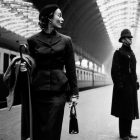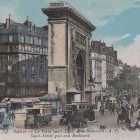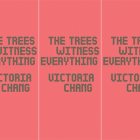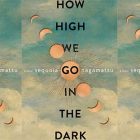Jack London’s Visionary 1912 Pandemic Novel
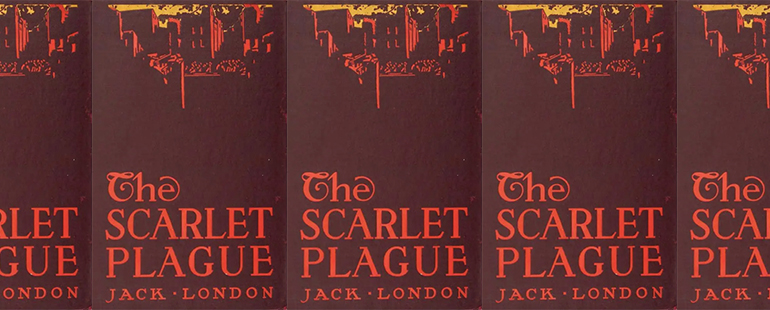
No prophetic vision was required of Jack London for him to speculate that there might be an outbreak of plague in the twenty-first century. By his 1876 birth in San Francisco, the Bubonic plague of the fourteenth and fifteenth centuries—aka The Black Death, aka The Plague—had settled deep into the world’s collective conscience. As a teenager, London would also see the United States finally begin to track cases of tuberculosis, which he learned “entered into men where they were thickly packed.” The details of the pandemic that breaks out in his 1912 novel, The Scarlet Plague, are thus familiar to us, but still speculative. Like COVID-19, London’s scarlet death sneaks into the body, revealing its symptoms only after a day or two. The difference is that the scarlet plague means certain death. On being infected, subjects turn scarlet red, convulse, and their heart rate increases until they go numb and die. And then there’s this: “No sooner was a person dead than the body seemed to fall to pieces, to fly apart, to melt away even as you looked at it. That was one of the reasons the plague spread so rapidly. All the billions of germs in a corpse were so immediately released.”
In 1912, London predicted that the world’s population, according to the 2010 census, would be eight billion people. He overestimated by one billion, but the figure was close enough to prove his point: the more people there are, the easier it is for germs and bacteria to spread. The author was a visionary not for these factual predictions, however, but for those related to the way the inequities of his world would only grow exponentially as its population did—the way those inequities would define the events that took place during the plague and its aftermath.
Before the onset of the book’s pandemic, London’s protagonist went by the name James Howard Smith. He lived comfortably as a professor at UC Berkeley. The year is 2073 when we meet him, sixty years after the plague killed ninety-nine percent of the world’s population. The professor, like other survivors, was inexplicably immune. Sitting down for a rest along a walk around the hills of the Bay Area, he begins to tell a group of young hunters—on their goading—of the summer of 2013 and how the plague came to be. The boys call Smith “Granser,” a shorthand for “grandpa,”—some of them are actually his grandchildren, while others are just his tribe’s younglings. He is the last living survivor of the plague, and so his name serves the double purpose of denoting his role in reforming civilization.
Granser is a miserly fellow, a grizzled prism from which London projected his own myriad real-world gripes with 1912 society—a society not dissimilar from ours today, over one-hundred years later. Rightfully, London predicted that the world would be dominated by a minority of industrialists by the time of his fictional plague, occurring at the same time as our present. It’s not just this oligarchical society Granser has gripes with, but his current circumstances too. By 2073, only a small handful of tribes occupy the entire upper half of California and the world has turned into a bleak, overgrown landscape dominated by beasts of prey. In the sixty years between when the plague destroyed humanity and the story’s present, Granser has been hardened by loneliness and despair, exacerbated by three years spent alone in Yosemite, “in an utter loneliness that none but a man who has once been highly civilized can understand.” At the time of his storytelling, there is no food production, no emphasis in society on education. Thus, his grandchildren only know hunting and gathering, and he laments the lack of intellectual discourse available to him. “You are true savages,” he tells the boys. “The human race is doomed to sink back farther and farther into primitive night ere again it begins its bloody climb upward to civilization.”
One of the boys, called Hare-Lip, finds the former Berkeley professor amusing. “What a gabble the old geezer makes,” he says. The boys aren’t the only target of his dismay—before the book’s plague, the then-professor lived in a world where science was respected; bacteriologists gave logical explanations for the reasons the plague broke out. But in 2073, in the absence of real doctors, pseudoscientists are among those who remain. He tries to tell the boys: “And, my grandsons . . . Let me warn you against the medicine-men. They call themselves doctors, travestying what was once a noble profession, but in reality they are medicine-men, devil-devil men, and that make for superstition and darkness. They are cheats and liars.” The boys call to mind those who deny the science of COVID-19 today. Of germs, for example, Hare-Lip says, “Anything you can’t see, ain’t, that’s what. Fighting things that ain’t with things that ain’t! They must have been all fools in them days. That’s why they croaked. I ain’t goin’ to believe in such rot, I tell you that.”
Granser also tells the boys how the early days of the plague were rather pleasant. Many of us today who are more introverted can identify; we tweeted about how well the social distancing suited us in March and April. Eventually, Granser’s family asks him to quarantine. “To all of this I agreed,” he says, “Staying in my house and for the first time in my life attempting to cook. And the plague did not come out on me. By means of the telephone I could talk with whomsoever I pleased and get the news. Also, there were the newspapers, and I ordered all of them to be thrown up to my door so that I could know what was happening with the rest of the world.” This coziness is underwritten by a society of dramatic disparity, a prediction that London likely made based on his blue-collar job experiences; one year after The Scarlet Plague came out, Henry Ford’s assembly line cranked into action. “Our food-getters were called freemen,” Granser tells the boys. “This was a joke. We of the ruling classes owned all of the land, all the machines, everything. These food-getters were our slaves. We took almost all the food they got, and left them a little so that they might eat, and work, and get us more food.” This sentiment is darkly analogous to the situation we find ourselves in today. The most high-risk activity I engage in during this pandemic is grocery shopping. In my most protective mask, I sprint through my Publix like I’m in a post-apocalyptic episode of Supermarket Sweep, dodging Instacart employees. Then I speed home, the road filled with drivers for Uber Eats, Postmates, Grubhub, and Doordash. Notably, the conveniences afforded to those who can quarantine safely in The Scarlet Plague are a mere ruse for the coming apocalypse.
During his time, London existed somewhere between the attitudes of Granser, an academic with an eye towards companionship and survival of humanity, and the attitudes of the boys, rowdy individualists with a healthy fear of incisive academics. The author was a socialist who struggled to make ends meet until much later in life. For work, he bounced miserably between odd jobs, including as a seal clubber (what it sounds like), oyster pirate (what it sounds like), and laundryman (what it sounds like). He worked in canneries, shoveled coal, and processed jute. He lived in the machinery of the industrial revolution. This is why he could envision Granser’s world. To make the boys try to understand the world pre-plague, Granser tells them a story about one of their deceased matriarchs, Vesta Van Warden. “John Van Warden, her husband,” he says, “Worth one billion, eight hundred millions and President of the Board of Industrial Magnates, had been the ruler of America. Also, sitting on the International Board of Control, he had been one of the seven men who ruled the world.” In Granser’s 2013, it wasn’t presidents who ruled the world, but titans of industry—as it is today. He questions the sustainability of such a world, repeating a line over and over again throughout his storytelling. “The fleeting systems lapse like foam.”
Rightfully, Granser is still nostalgic about the vanished pre-pandemic world. “I sometimes think the most wonderful achievement was food—its inconceivable abundance, its infinite variety, its marvellous delicacy,” he tells the boys. “O my grandsons, life was life in those days, when we had such wonderful things to eat.” The systems that belied this abundance, though, were sinister. More food meant more everything: more farms, more factories, more people. The more people there are, the easier it is for a virus to spread. Granser tells the boys of how, after the plague, he walked all over California, observing the “pestilential dead” being feasted on by wild packs of dogs, and how, on abandoned farms “the food for millions of mouths was growing, ripening, and going to waste.” There was abundance before the plague, an abundance London foresaw with the onset of industrialization. This predicted abundance is strikingly similar to the world we live in today. In a world of overabundance, London’s germs found ample hosts.
Some generic dystopian scenes ensue after the outbreak of the book’s eponymous plague. There is looting and burning. The professor observes a grocery store being robbed. “I did not go to the groceryman’s assistance,” he says. “The time for such acts had already passed. Civilization was crumbling, and it was each for himself.” Amidst the general chaos, he attempts to focus in on the specific human tragedies. First, of the bacteriologists dying to try and find a cure, he says, “They were heroes.” Then, of a reporter staying on the “wireless dispatch” to share information about the pandemic, he says, “He was a hero, that man who staid by his post—an obscure newspaperman, most likely.” And of two men who sacrifice themselves when they move a mass of infected bodies out of a doorway so survivors can escape, he says, “They were heroes.” Though it’s haunting to imagine a mass death like the one in the book, we too have had to endure the deaths of frontline workers. We, too, call them heroes.
But what we haven’t had to necessarily endure is an exodus of large swaths of the population leaving dense urban areas for the countryside, where in The Scarlet Plague they found no respite from the death anyway. When this happens, the end is nigh. Granser escapes the fires and looting in his neighborhood and tries to hide out on the UC Berkeley campus, but the school president locks him out of the building, for fear he has been exposed to the plague. “He shouted to me through the door to go away,” he says. While this is all happening, those who can get away quickly do, but the plague is the great equalizer. It doesn’t distinguish between classes: “Even the airships of the rich, fleeing for the mountain and desert fastness, carried the germs.” Regardless, those who had previously lived in uninhibited abundance felt that quarantines and social distancing shouldn’t apply to them. Reading this, visions of high rental rates at Joshua Tree AirBnBs loom in my mind; I think of influencers flying to Tulum in private “dirigibles.” I have had a part in this inequitable movement: with the ability to teach remotely, I took off in a camper van, or, as Granser might describe to the boys, my “private motor-car.” It wasn’t so much a flight of privilege though, but rather a lack of faith in my fellow Miami citizens to stop the spread of the virus.
Late in his life, London sought escape from the industrializing and developing urban world for the hills of Sonoma. He purchased a ranch in Glen Ellen, California, where he planned the construction of a large house, which he called the Wolf House. Tragically, it burned down during construction. Having lived a hard life of drinking and working, he was already near death at that point, but the world taking his most singular expression of wealth from him may have given him one final chuckle. “The fleeting systems lapse like foam.”
